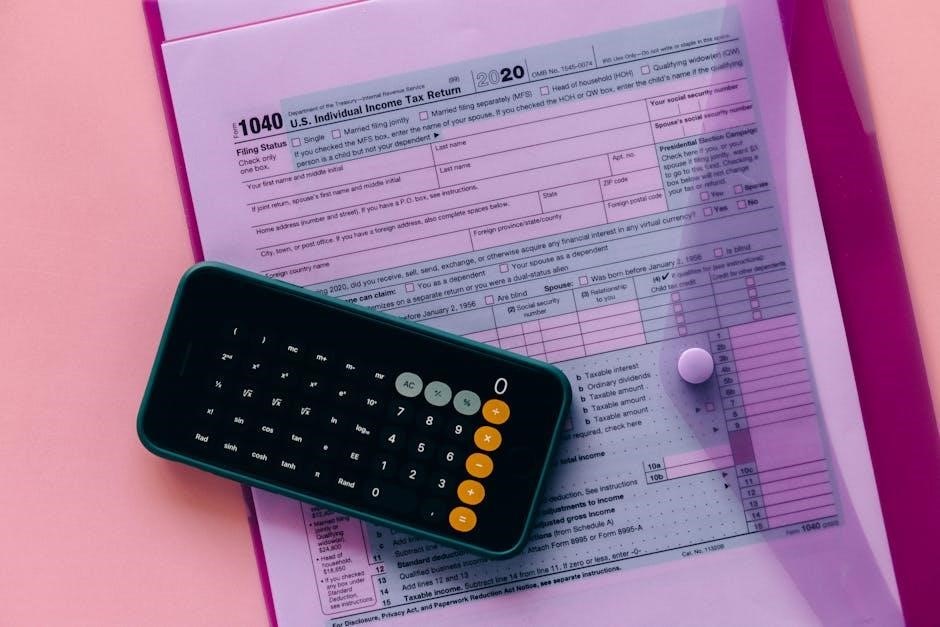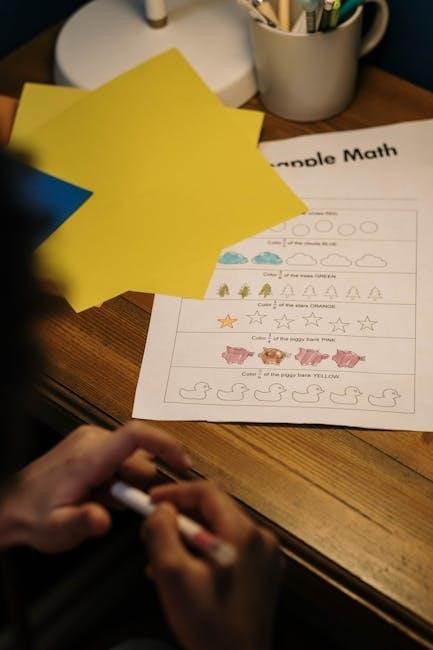Year 5 maths worksheets provide essential practice for students, covering key topics like addition, subtraction, multiplication, and division․ Available in PDF format, they offer a structured way to build confidence and fluency in maths skills through regular practice․

Overview of Year 5 Maths Curriculum
The Year 5 maths curriculum is designed to build upon foundational skills while introducing more complex concepts․ It focuses on developing proficiency in number operations, including multiplication, division, and multi-digit calculations․ Students also explore fractions, decimals, and basic geometry, such as identifying shapes and understanding measurement․ The curriculum emphasizes problem-solving and real-world applications, preparing students for higher-level maths in subsequent years․ Worksheets play a crucial role in reinforcing these concepts, offering structured practice and helping students master essential skills․
Importance of Worksheets in Learning
Worksheets are a vital tool in Year 5 maths education, providing students with structured and focused practice․ They help reinforce key concepts, such as arithmetic operations, fractions, and geometry, in a clear and organized manner․ Regular use of worksheets enables students to develop problem-solving skills and build confidence in their abilities․ Additionally, worksheets offer a way to track progress over time, identifying areas where extra support may be needed․ Their portability and accessibility make them ideal for homework, independent practice, or quick assessments in class․ Worksheets also encourage self-directed learning, allowing students to work at their own pace and review challenging topics․ Overall, they are an essential resource for mastering Year 5 maths skills and preparing for future academic challenges․

Core Topics Covered in Year 5 Maths Worksheets
Year 5 maths worksheets cover a variety of essential topics, including whole number operations, fractions, decimals, geometry, and word problems․ These exercises help build a strong foundation in maths․
Addition and Subtraction of Whole Numbers

Addition and subtraction of whole numbers are fundamental skills in Year 5 maths, focusing on multi-digit calculations․ Worksheets often include exercises with 3 or 4-digit numbers, emphasizing place value and borrowing techniques․ These activities help students master column addition, mental maths strategies, and the application of number facts․ Regular practice with these operations builds fluency and confidence, essential for tackling more complex problems later․ PDF worksheets provide structured and engaging ways to reinforce these skills, ensuring students grasp the concepts thoroughly․ By practicing these core arithmetic operations, students develop a solid foundation for advanced maths topics in higher grades․
Multiplication and Division of Multi-Digit Numbers
Multiplication and division of multi-digit numbers are critical skills in Year 5 maths, focusing on complex calculations and real-world applications․ Worksheets often include exercises on long multiplication and division, teaching students to break down problems systematically․ These activities emphasize the use of the distributive property and inverse operations to check results․ Regular practice helps students develop accuracy and speed in solving multi-step problems․ PDF worksheets provide a variety of challenges, from multiplying and dividing by single-digit numbers to working with larger multi-digit calculations․ These exercises build a strong understanding of number relationships and prepare students for algebraic concepts in later years․ By mastering these operations, students gain confidence in tackling more advanced mathematical challenges․
Fractions and Decimals Basics

Fractions and decimals form a fundamental part of Year 5 maths, introducing students to concepts that are essential for more complex mathematical operations․ Worksheets focus on understanding basic fraction operations, such as adding, subtracting, and simplifying fractions, as well as converting between fractions and decimals․ Students learn to identify equivalent fractions, compare fractions, and perform calculations involving mixed numbers․ Decimals are introduced to build a bridge between whole numbers and fractions, with exercises on place value, rounding, and basic arithmetic operations․ These resources often include visual aids, such as diagrams and number lines, to help students visualize and grasp these abstract concepts․ Regular practice with these worksheets ensures a solid foundation for advanced topics like algebra and geometry in later years․ Mastering fractions and decimals is crucial for problem-solving in real-world scenarios, making these skills indispensable for future academic success․
Geometry and Measurement Fundamentals
Year 5 maths worksheets emphasize geometry and measurement to develop spatial awareness and practical skills․ Topics include identifying and naming shapes, such as regular and irregular polygons, and understanding properties like angles and sides․ Measurement exercises focus on calculating perimeter, area, and volume, as well as converting units of length, capacity, and mass․ Students also explore time concepts, such as reading analog clocks, calculating elapsed time, and understanding intervals․ Worksheets often incorporate visual aids, like grids and diagrams, to help students visualize and solve problems; Real-world applications, such as measuring room dimensions or calculating the area of a garden, make learning engaging and relevant․ These foundational skills are essential for progressing to more complex geometry and measurement challenges in higher grades, ensuring students can apply maths confidently in everyday situations․
Word Problems and Real-World Applications
Year 5 maths worksheets often include word problems that connect mathematical concepts to real-life scenarios, helping students apply their skills practically․ These problems cover a range of topics, such as shopping, cooking, and transportation, requiring students to interpret and solve mathematical challenges in context․ Worksheets may involve multi-step problems, such as calculating total costs, measuring ingredients, or determining travel times․ Visual aids like diagrams and tables are sometimes included to support understanding․ Answer keys provide feedback, allowing students to review their work and improve problem-solving strategies․ By engaging with these real-world applications, students develop critical thinking and communication skills, preparing them to tackle everyday maths challenges with confidence․ This approach ensures maths is not just an abstract concept but a tool for navigating real-life situations effectively․

Advanced Topics in Year 5 Maths
Advanced topics include algebraic concepts, basic data handling, and mental maths, challenging students to think critically and prepare for higher-level mathematics․
Year 5 maths worksheets introduce algebra through simple equations and patterns, helping students understand variables and basic expressions․ These exercises are designed to build foundational skills for more complex algebra in later years․ By using real-world examples and visual aids, worksheets make abstract concepts engaging and accessible; Regular practice with these materials enhances problem-solving abilities and logical thinking․ The inclusion of answer keys allows for self-assessment, reinforcing learning and identifying areas for improvement․ These resources are invaluable for students beginning their journey into algebra, providing a solid groundwork for future academic success․
Basic Data Handling and Statistics
Year 5 maths worksheets introduce students to basic data handling and statistics, teaching them to collect, organize, and interpret data․ These resources include activities like creating simple bar graphs, pictograms, and tally charts․ Students learn to understand and analyze data from everyday situations, such as favorite colors or pets in the class․ Worksheets also cover basic statistical concepts, like finding the mode, median, and range․ Practical exercises involve sorting and categorizing information, which helps build foundational skills for more advanced data analysis․ Interactive and engaging, these PDF worksheets make learning statistics fun and accessible․ They also include answer keys, allowing students to check their work and gain confidence in their abilities․ Regular practice with these materials prepares students for real-world applications of data handling and statistical reasoning․
Mental Maths and Quick Calculations
Mental maths and quick calculations are vital skills for Year 5 students, enhancing their speed and accuracy in solving problems․ Worksheets focus on developing these abilities through timed exercises and arithmetic drills․ They cover basic operations like addition, subtraction, multiplication, and division, encouraging students to think critically and make swift calculations without relying on written methods․ These resources often include mixed-operation quizzes, which help students apply their knowledge across different areas of maths․ Additionally, real-world scenarios are incorporated to demonstrate the practical use of mental maths․ Answer keys are provided for self-assessment, allowing students to track their progress and identify areas for improvement․ Regular practice with these worksheets builds confidence and prepares students for more complex mathematical challenges in higher grades․ They are an essential tool for fostering mental agility and mathematical fluency in a structured and engaging way․

Effective Use of Worksheets
Using Year 5 maths worksheets effectively involves consistent practice and review․ Students should complete exercises regularly, leveraging answer keys for feedback to identify and correct mistakes promptly․
Creating a Study Routine
Establishing a consistent study routine is crucial for mastering Year 5 maths․ Dedicate specific times each day or week to focus on maths practice using worksheets․ Start with short, manageable sessions of 15–20 minutes, gradually increasing as concentration improves․ Organize the routine by topic, such as allocating Mondays for addition practice and Wednesdays for fractions․ Incorporate mental maths exercises for quick calculations and problem-solving skills․ Use PDF worksheets to practice multi-digit multiplication and division, ensuring regular review of concepts․ Include breaks to avoid burnout and maintain engagement․ Over time, this structured approach will help build confidence and fluency in maths, preparing students for more advanced topics․ Consistency is key to achieving long-term progress and a strong foundation in Year 5 maths․
Utilizing Answer Keys for Feedback
Answer keys in Year 5 maths worksheets are invaluable tools for providing immediate feedback and fostering self-assessment․ By comparing their work with the correct answers, students can identify mistakes, understand common errors, and improve their problem-solving skills․ Parents and teachers can also use these keys to guide pupils, reinforcing learning and addressing gaps in understanding․ Many PDF worksheets include answer keys, making it easy to track progress and celebrate achievements․ Regular feedback helps students stay motivated and builds confidence in their maths abilities․ Over time, this process encourages independence and a growth mindset, essential for mastering Year 5 maths and beyond․ Consistent use of answer keys ensures that learners can refine their techniques and approach challenges with clarity and precision․


Benefits of Using PDF Worksheets
PDF worksheets offer numerous advantages for teaching and learning maths in Year 5․ They are easily accessible, printable, and can be shared without losing quality, making them ideal for both classroom and home use․ PDFs are compatible with all devices, allowing students to practice maths anywhere, anytime․ Additionally, PDFs are eco-friendly, reducing the need for physical resources․ They also provide a consistent format, ensuring clarity and readability․ Many PDF worksheets include answer keys, enabling self-assessment and immediate feedback․ This feature helps students track their progress and identify areas for improvement․ Furthermore, PDFs are cost-effective and widely available, offering a flexible and efficient way to support maths education․ Their convenience and reliability make them a popular choice among parents, teachers, and students alike․ Using PDF worksheets enhances learning experiences while maintaining organization and structure in maths practice․
